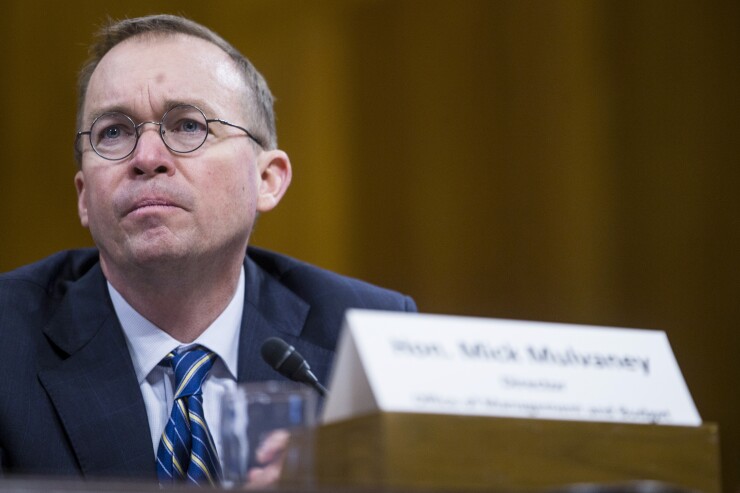An ethics watchdog is calling for an investigation into acting Consumer Financial Protection Bureau Director Mick Mulvaney for allegedly misleading Congress about a foreclosure on an investment property he owns in South Carolina.
Citizens for Responsibility and Ethics in Washington on Monday asked the Federal Reserve's inspector general to investigate whether Mulvaney misled the Senate Budget Committee by claiming he had paid off his debts on a 17-acre parcel of undeveloped land in Indian Land, S.C. Mulvaney is also the permanent director of the Office of Management and Budget, and faced questioning from the Budget Committee as part of his confirmation process.
The property, which was owned by a limited liability company that had been created to buy the land, went into foreclosure in late 2016.

The watchdog sent a nine-page letter to the Fed's IG, Senate Budget Committee Chairman Mike Enzi, R-Wyo., and Sen. Bernie Sanders, I-Vt., alleging Mulvaney may have made materially false statements about the property's foreclosure, which he said in his confirmation hearings was "uncontested."
Mulvaney failed to inform the Senate that three days before he was confirmed to lead the OMB, a private lender had filed a $2.6 million breach of contract claim in foreclosure proceedings on the investment property, the watchdog group alleges.
In his Senate nomination papers, Mulvaney said he was a minority owner in the land, and both a plaintiff and defendant in the foreclosure proceedings.
The group alleges Mulvaney created "a web of limited liability corporations ... and loan arrangements to acquire and preserve his investment in a single parcel of real estate."
"It appears Mr. Mulvaney violated his ethical obligations by taking complex, unusual and potentially dishonest steps to avoid paying debts his company owed related to the property at issue in the foreclosure," Noah Bookbinder, CREW's executive director, wrote in the letter.
"By making false and misleading statements and failing to correct and update his Senate nomination papers prior to his confirmation, Mr. Mulvaney may have made a material false statement."
The CFPB did not immediately respond to a request for comment.
At issue is Mulvaney's interest in a company called Lancaster, which bought a single 17-acre parcel of land in 2007 at the height of the financial crisis.
The watchdog group alleges that Mulvaney secured his investment in the land in 2016 to jump ahead of another investor as the primary lien holder.
The land initially was financed in 2007 with $1.4 million from a private lender, Fonville & Co., and $3.45 million from First Charter Bank, the letter states. (First Charter was sold to Fifth Third Bank in 2008.)
In 2008, the First Charter loan was refinanced by or sold for $3.7 million to Paragon Commercial Bank, of Raleigh, N.C., which became the first-lien holder on the property, according to the letter.
Lancaster defaulted on the loan in October 2016, nearly 10 years after the loan was originated, the letter states.
Also in late 2016, Mulvaney acquired the first-lien loan from Paragon by personally guaranteeing a loan from Southern First Bank, for between $1 million and $5 million, the letter states.
Paragon then assigned the mortgage on the property to a separate LLC owned by Mulvaney, the letter states.
"Rather than stand in line after the lien holders, Paragon Bank and Fonville, Mr. Mulvaney took unusual and questionable steps to take the place of Paragon Bank and strip Fonville of its interest in the property, thereby preserving his own investment," Bookbinder wrote.





